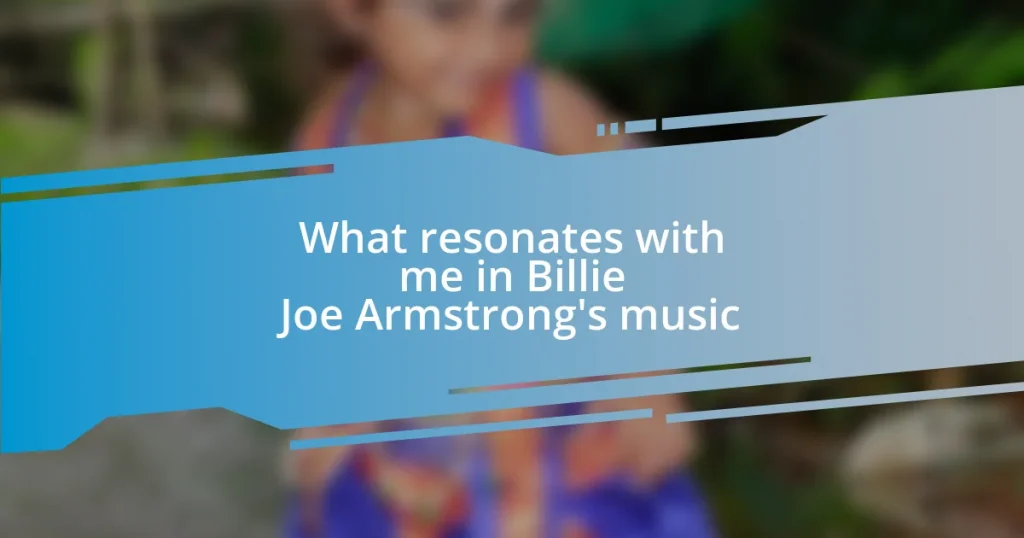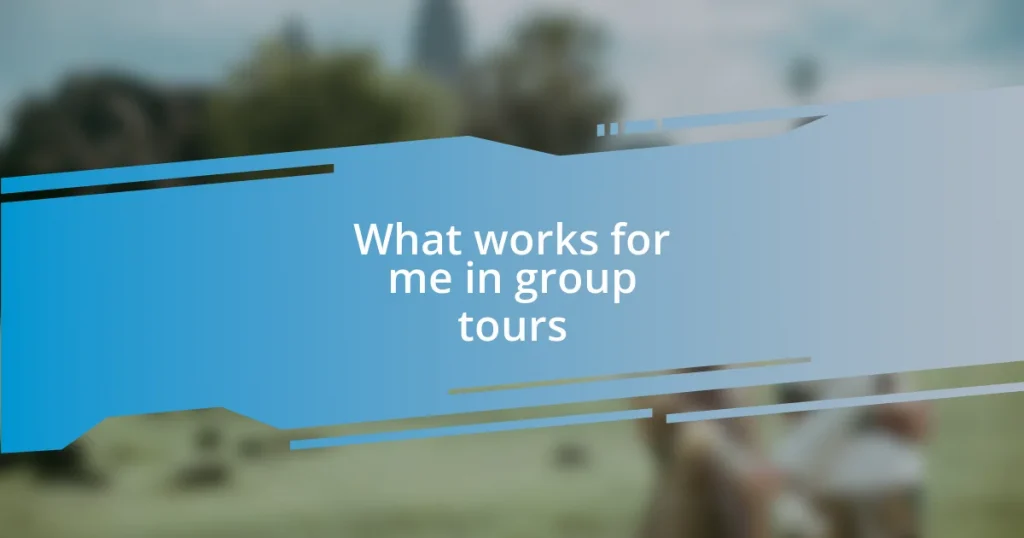Key takeaways:
- Billie Joe Armstrong’s music blends punk rock grit with melodic sensibilities, creating a deeply engaging and relatable sound.
- His lyrics evoke powerful emotions like catharsis, nostalgia, and empowerment, fostering a sense of community among listeners.
- The use of musical dynamics and instrumentation enhances the emotional impact of his songs, creating memorable auditory experiences that mirror personal feelings.
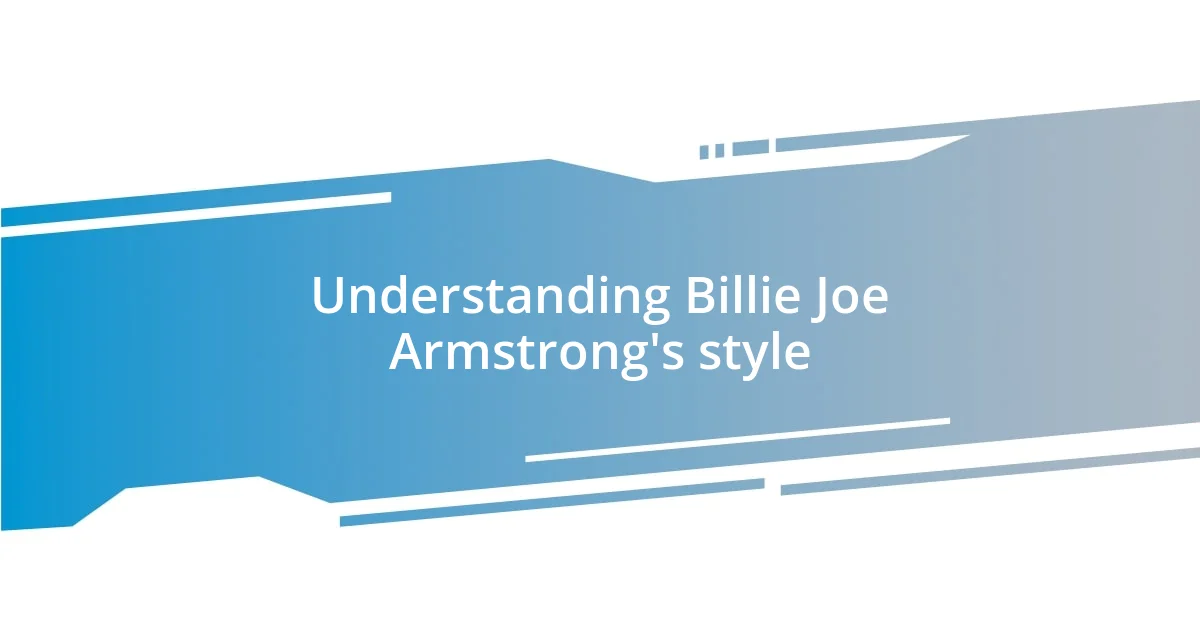
Understanding Billie Joe Armstrong’s style
Billie Joe Armstrong’s style resonates deeply with me because it’s unapologetically raw and energetic. His ability to blend punk rock grit with melodic sensibilities creates an infectious sound that keeps you engaged. I often find myself tapping my feet or nodding my head whenever one of his tracks plays; it’s as if his music has an innate rhythm that echoes my own heartbeat.
When I listen to his lyrics, I feel like I’m diving headfirst into the chaos and beauty of life. Take a song like “Wake Me Up When September Ends”—the way he channels personal loss into such a powerful narrative is nothing short of remarkable. Have you ever experienced that cathartic moment when a song captures your emotions perfectly? For me, it’s like a breath of fresh air; it connects the dots between my own experiences and his storytelling.
There’s a distinct balance in Armstrong’s work between vulnerability and rebellion. I remember attending a Green Day concert and being struck by the energy in the crowd when he sang “American Idiot.” People were jumping and singing along, united by a shared sense of defiance. It made me ponder: how can music evoke such collective emotions? Armstrong’s ability to articulate the struggles of a generation with his unmistakable voice truly exemplifies the power of music to connect us all.
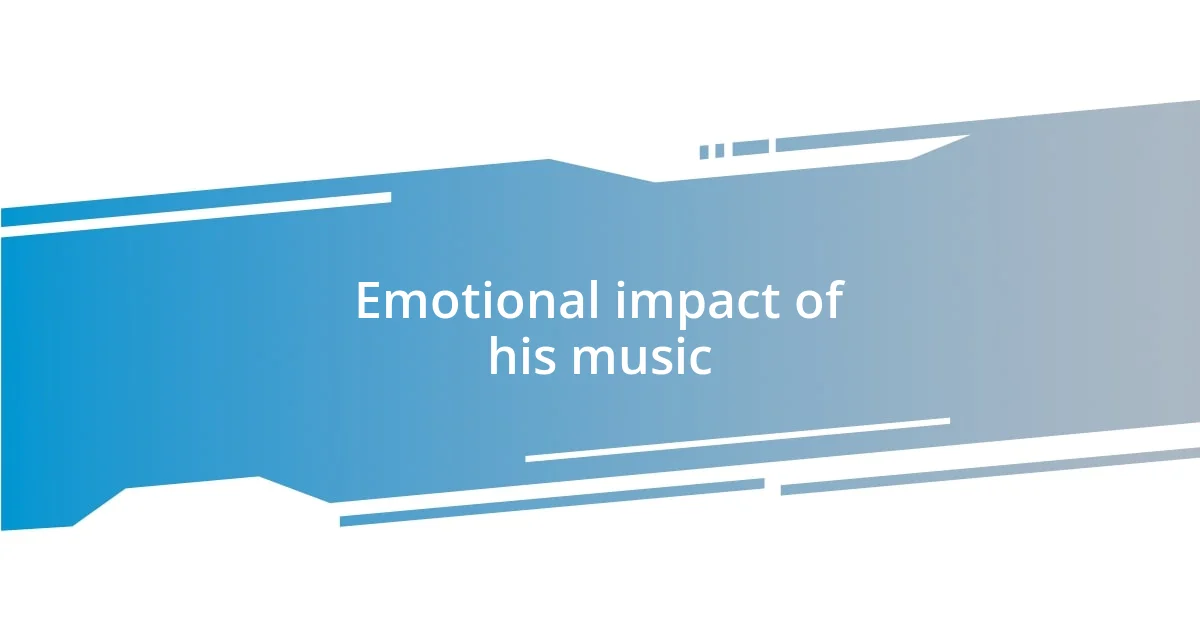
Emotional impact of his music
Listening to Billie Joe Armstrong’s music often feels like a deeply personal journey. His lyrics touch on themes of heartbreak, identity, and resilience, making them universally relatable. I recall being in my car, driving aimlessly, when “Good Riddance (Time of Your Life)” came on. As I sang along, I felt an overwhelming sense of nostalgia wash over me, reminding me of both the good times and the bittersweet moments of life. It’s amazing how his music can stir up such palpable emotions, often leaving me reflecting on my own experiences long after the song has ended.
Here are some key emotional impacts of his music that resonate with listeners:
- Catharsis: His songs often serve as an outlet for deep-seated feelings, providing a space for listeners to process their own emotions.
- Connection: Billie Joe’s exploration of personal and social themes fosters a sense of community among fans, creating a shared emotional experience.
- Empowerment: Tracks like “Basket Case” empower listeners to confront their struggles, transforming vulnerability into strength.
- Nostalgia: His storytelling often evokes memories, transporting us back to significant moments in our lives.
Each of these elements makes his music not just something to listen to but something to feel and connect with on a profound level.

Personal connections to specific songs
When I think of “21 Guns,” I can’t help but recall a moment during my college years when I was grappling with uncertainty about my future. That song played during one of those late-night drives, the moonlight pouring through my car window. Armstrong’s voice seemed to echo my own struggles, creating a powerful sense of solidarity. How often do we find that elusive feeling of being understood through music? It’s striking how a few chords can encapsulate confusion, hope, and resilience, warming the heart while echoing the mind.
Listening to “Boulevard of Broken Dreams” brings back memories of my early twenties, a time filled with self-discovery. I remember walking through downtown, earbuds in place, and feeling incredibly alone in a crowd. Armstrong’s haunting vocals perfectly encapsulated my emotions, as if he were voicing my insecurities. Reflecting on those moments, I realize how his ability to articulate feelings of isolation can be both comforting and empowering. It’s incredible how music can guide us through our darkest thoughts, don’t you think?
The raw energy in “Holiday” always compels me to move, almost pulling me into its upbeat embrace. I can vividly picture dancing around my living room during a winter evening, letting the music sweep me away. This song became my anthem for embracing freedom and shaking off the weight of everyday life, reminding me of the joy that can be found even when times are tough. Have you ever danced like no one is watching? Armstrong’s knack for infusing happiness and freedom into his music creates a genuine connection that’s hard to deny.
| Song | Personal Connection |
|---|---|
| 21 Guns | Captured feelings of uncertainty during college; resonated deeply during a reflective late-night drive. |
| Boulevard of Broken Dreams | Evoked memories of loneliness in a crowded city; served as a voice for my insecurities in my early twenties. |
| Holiday | Inspires movement and joy; became an anthem for embracing freedom in difficult times, reminding me to celebrate life. |
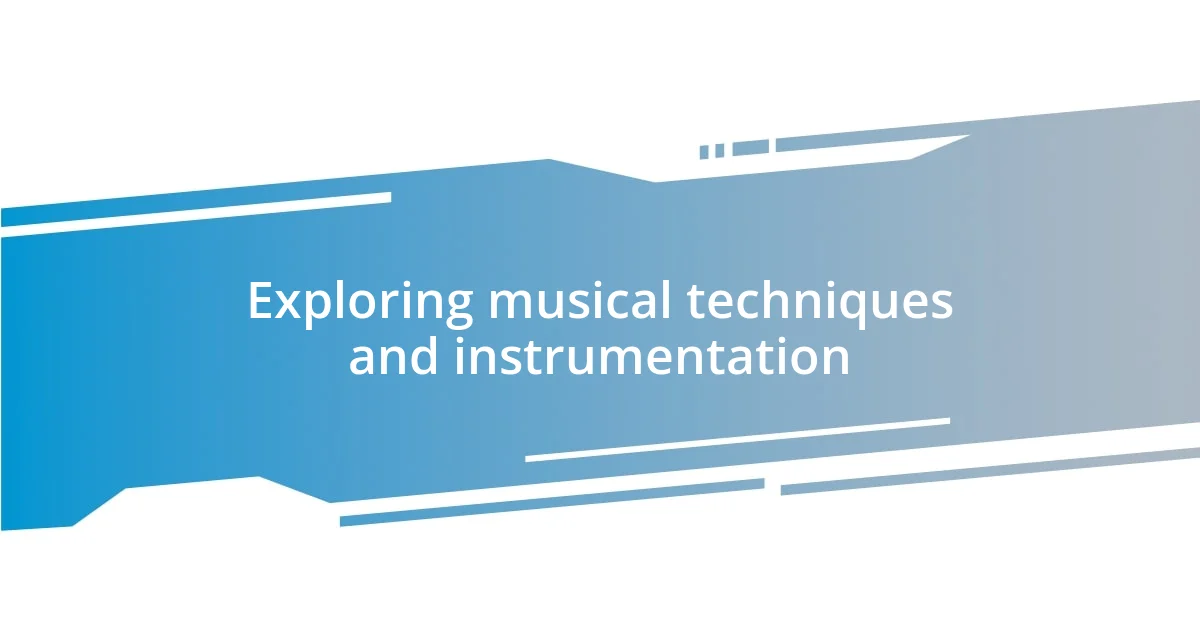
Exploring musical techniques and instrumentation
When I listen to Billie Joe Armstrong’s music, I can’t help but marvel at his masterful use of dynamics. For instance, the contrast between quiet verses and anthemic choruses can create a rush of energy that pulls me in. I remember hearing “Wake Me Up When September Ends” for the first time and feeling the way the instrumentation swells and recedes, much like the ebb and flow of emotions I’ve experienced. Have you ever felt a song mirror your own highs and lows?
The layering of guitars and driving rhythms in songs like “American Idiot” takes me on a wild sonic journey. The punk rock elements shine through, with palm-muted riffs that add a punch to the lyrics. Just yesterday, I found myself jamming out to it in my living room, reflecting on how its rebellious spirit ignites a sense of urgency in me. It’s fascinating how the right instrumentation can inspire action and provoke thought, isn’t it?
Armstrong also has a knack for incorporating unexpected elements, like the haunting strings in “When I Come Around.” This unique touch gives the track an emotional weight that lingers long after the last note fades. I still recall hearing it on a rainy afternoon, the sound of raindrops tapping against my window. It made me ponder how we can connect with our feelings through various layers of sound. What if every instrumental choice was a deliberate step towards crafting a more profound narrative?











